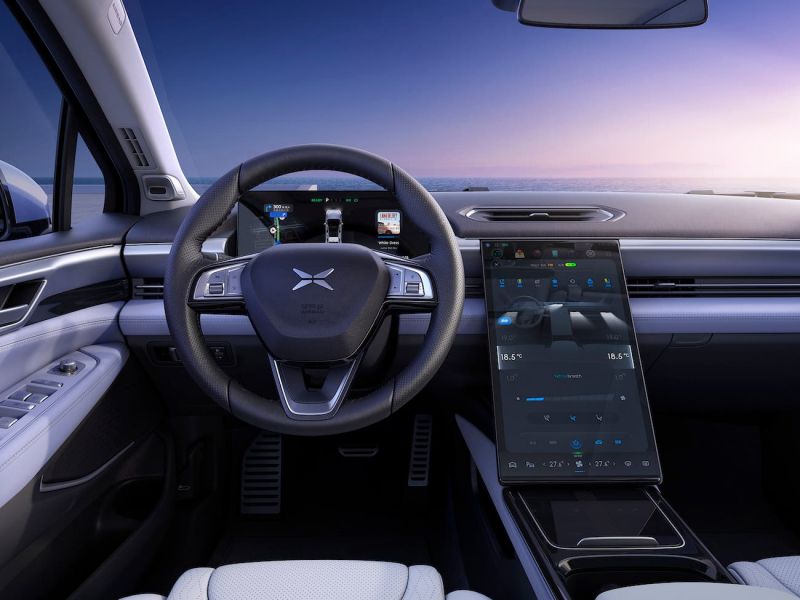China's XPeng Sets Up a New Autonomous Driving Company for Robotaxis
【Summary】Electric vehicle startup XPeng has established an autonomous driving subsidiary named “Guangzhou Pengxu Autonomous Driving Technology Co., Ltd.” that will focus on commercial mobility services, Chinese news outlet Gasgoo reports. During Xpeng’s Q3 financial report conference in Nov 2021, XPeng chairman and CEO He Xiaopeng, said the company plans to launch its own robotaxi service in the second half of 2022.

Electric vehicle startup XPeng has established a new autonomous driving subsidiary named "Guangzhou Pengxu Autonomous Driving Technology Co., Ltd." that will focus on commercial mobility services, Chinese news outlet Gasgoo reports.
The new company was registered on Feb 14, with Xia Heng, XPeng's founder and president serving as the company's legal representative.
The new company is wholly-owned by Xpeng and was formed with a registered capital of RMB10 million ($1.5 million). Accroding to Gasgoo, the company is related to providing robotaxi services.
During Xpeng's Q3 financial report conference in Nov 2021, XPeng chairman and CEO He Xiaopeng, said the company plans to launch its own robotaxi service in the second half of 2022. The service will launch in Guangzhou. The first batch of pilot operation vehicles will be powered by XPeng's signature XPILOT 3.5 autonomous system and gradually transition to the more advanced version XPILOT 4.0.
XPeng expects its robotaxi service fleet will complete an average of 8,000 to 10,000 kilometers of monthly testing mileage per vehicle, Xpeng's CEO said in November.
Much of Xpeng's focus has been on developing autonomous driving technology for its electric vehicles. Around half of the company's employees work in R&D on self-driving technology and other related fields, such as artificial intelligence.
XPeng's XPILOT autonomous driving system is highly advanced. Xpeng's fourth model, the flagship G9 SUV unveiled in November, is the company's first production model to incorporate its new X-EEA 3.0 electronic and electrical architecture, as well as the first to offer the latest version of its advanced driver assistance system XPILOT 4.0.
XPeng's X-EEA 3.0 architecture includes a centralized supercomputing platform and local control modules.
Xpeng said that XPILOT 4.0 will be the first platform to deliver fully-autonomous driving. It marks a significant step towards achieving fully autonomous driving in the future, according to the company.
The G9 will be China's first EV to implement a Gigabit Ethernet communications architecture, supporting multiple communication protocols, allowing vehicles to transmit and receive data much faster. The faster data transfers support XPILOT 4.0 and other smart vehicle systems.
To support higher levels of autonomous driving, XPILOT 4.0 is built on an entirely hardware platform powered by dual NVIDIA DRIVE Orin processors. The system delivers 508 TOPS (trillions of operations per second) computing power to act as the brains of the vehicle. The powerful processing capabilities of XPeng's autonomous driving platform is suitable for robotaxi applications.
XPeng's XPILOT is made to handle complex driving scenarios on China's highways. The Navigation Guided Pilot ("NGP") feature allows drivers to simply enter a destination and the vehicle will navigate to it without human intervention in most cases. Xpeng considers its to be a SAE level-3 autonomous driving system, which means that the system can operate without human intervention.
XPeng is also developing electric vertical take off and landing aircraft (eVTOL). In Sept 2021, HT Aero, an urban air mobility (UAM) company and an affiliate of Chinese electric vehicle startup XPeng Inc., announced that it has entered into a definitive agreement with a consortium of investors to raise over US$500 million in Series A funding.
HT Aero unveiled its fifth-generation flying vehicle dubbed the "XPeng X2" at the 13th China International Aviation & Aerospace Exhibition last year (Airshow China 2021).
The X2 is a two-seater enclosed-cockpit eVTOL aircraft that combines both automotive and aerospace technologies for urban flight. It's equipped with an intelligent flight control system and autonomous flying capability, including fully autonomous return and landing.
China's tech giant Baidu Inc., which is often referred to as the "Google of China'', is also launching a robotaxi services in Chinese cities.
Baidu's commercial autonomous ride-hailing service is named "Apollo Go". It was officially launched in 2020 and continues to expand to new cities. As of Nov 2021, Apollo Go became the world's largest robotaxi service, according to Baidu.
-

Two Ford Crown Victorias Still Operating as Taxis in NYC
-

Mazda CEO's Opinion on EV Adoption in the U.S.
-

Hyundai's revolutionary powertrain design
-

Sustainability focus urged by Michelin Fleet Panel
-

BM Catalysts' UK Expansion
-

Warwick University's £12m funding for electric vehicle battery progress
-

Executive X Series: Unveiling the Powerful City/Vios Competitor
-

Hollywood couple defies expectations, showing affection after 20 years
- Hyundai to Launch Autonomous Ride-Hailing Service in South Korea
- Volkswagen Announces Pricing and Styling Updates for the 2023 ID.4 Electric SUV, Which is Being Assembled in Tennessee
- Urban Air Mobility Company Backed by Electric Automaker XPeng Inc Begins Trail Production of its Voyager X2 ‘Flying Car’
- Redwood Materials is Building an Electric Vehicle Battery Recycling Facility in South Carolina
- BMW to Test a New Battery in the iX Electric SUV Developed By Michigan Startup Our Next Energy Inc. That Can Deliver 600 Miles of Range
- Automakers Urge Consumers to Buy an EV Before Tax Credit Changes
- BMW Expands i4 Lineup With the Affordable eDrive35
- Toyota is Investing an Additional $2.5 Billion to Expand its North Carolina Factory to Boost EV Battery Production
- Foxconn-led Mobility in Harmony Consortium Announces ‘Project X’, an Open, Modular Electric Vehicle Platform
- Baidu CEO Believes That SAE Level-4 Autonomous Driving Systems Will the First to Enter Commercial Use After L2, Skipping Over L3



















 About Us
About Us Contact Us
Contact Us Careers
Careers